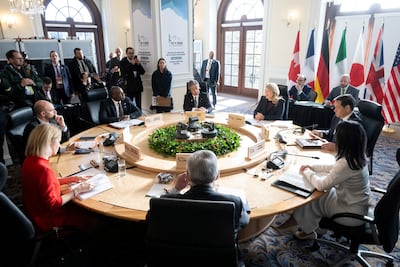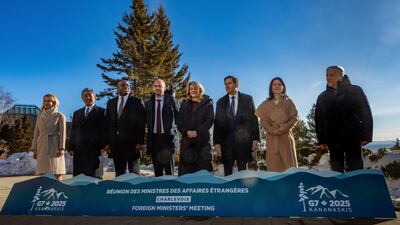Foreign ministers from the world’s seven leading democracies failed to agree on the need for a two-state solution to the Palestinian-Israeli conflict this week, instead calling for a “political horizon” for Palestinians.
The ministers underscored the imperative of finding a “negotiated solution” to the conflict that “meets the legitimate needs and aspirations of both peoples and advances comprehensive Middle East peace, stability and prosperity”.
The US was the lone country to object to directly referencing a two-state solution, a source told The National.
This outcome is in stark contrast to previous statements that followed meetings held during former US president Joe Biden's time in office, when the group repeatedly called for a two-state solution.
Speaking to reporters at the site of the G7 meeting in La Malbaie, Quebec, Canadian Foreign Minister Melanie Joly said Ottawa's position on the issue remained clear: “We believe in a two-state solution, period.”
When asked whether France still supports a two-state solution, the country's Foreign Minister Jean-Noel Barrot said “of course”. Italy's Foreign Minister also publicly endorsed a two-state solution.
The ministers repeated their call for the release of hostages held by Hamas in Gaza and also raised concerns about “growing tensions and hostilities in the West Bank”, where Israeli settlers have assaulted Palestinians and Israeli troops have carried out scores of raids in an attempt to root out militant groups.
The group also expressed support for Lebanon and Syria, and reiterated the importance of their “sovereignty and territorial integrity”. Israel has launched strikes against targets in both countries, as concerns mount that the Gaza war will continue to spill over into other countries.
The G7 ministers were unified in their concern over the role Iran plays in the region and said that Tehran must “never be allowed to develop and acquire a nuclear weapon”. The statement comes after US President Donald Trump said he had sent a letter to Iranian leadership expressing a desire to restart negotiations on a nuclear deal.
On the Russia-Ukraine war, the group welcomed recent developments brokered by the US, in which Kyiv agreed to a 30-day ceasefire.
“We called for Russia to reciprocate by agreeing to a ceasefire on equal terms and implementing it fully,” they said. Russian President Vladimir Putin said on Thursday that he supports the idea of a ceasefire but wanted a meeting with Mr Trump to iron out details.
The group also discussed implementing more sanctions on Russia if it does not agree to the ceasefire.
Speaking to reporters, US Secretary of State Marco Rubio said that regardless of Mr Putin saying he was open to the possibility of a ceasefire, “we're not going to make our foreign policy decisions on the basis of what a leader says at a press conference”.
The meeting in Canada came at a time of unprecedented tension between Ottawa and Washington. Mr Trump has repeatedly called for the annexation of Canada and expressed a desire to see it become the “51st state”. He also has placed major tariffs on Canada and threatened tariffs on the European Union and a host of other countries.
Several of the ministers wore small maple leaf pins on their lapels in an apparent show of solidarity with Canada. On Thursday, the German embassy in Ottawa posted a video on social media showing German Foreign Minister Annalena Baerbock and EU foreign affairs chief Kaja Kallas standing side by side, one in red, one in white, and gazing out over the icy waters of the Saint Lawrence River. The caption read: “We’ve got your back.”
Ms Joly met her American counterpart Mr Rubio on Thursday morning, and said they had a long, frank conversation.
“Canada's sovereignty is not up to debate. Period. There's no argument. There's no conversation about it. There's no need to talk about it. You're here. You respect us,” she said she had told him.
French business
France has organised a delegation of leading businesses to travel to Syria. The group was led by French shipping giant CMA CGM, which struck a 30-year contract in May with the Syrian government to develop and run Latakia port. Also present were water and waste management company Suez, defence multinational Thales, and Ellipse Group, which is currently looking into rehabilitating Syrian hospitals.
The Orwell Prize for Political Writing
Twelve books were longlisted for The Orwell Prize for Political Writing. The non-fiction works cover various themes from education, gender bias, and the environment to surveillance and political power. Some of the books that made it to the non-fiction longlist include:
- Appeasing Hitler: Chamberlain, Churchill and the Road to War by Tim Bouverie
- Some Kids I Taught and What They Taught Me by Kate Clanchy
- Invisible Women: Exposing Data Bias in a World Designed for Men by Caroline Criado Perez
- Follow Me, Akhi: The Online World of British Muslims by Hussein Kesvani
- Guest House for Young Widows: Among the Women of ISIS by Azadeh Moaveni
Who has been sanctioned?
Daniella Weiss and Nachala
Described as 'the grandmother of the settler movement', she has encouraged the expansion of settlements for decades. The 79 year old leads radical settler movement Nachala, whose aim is for Israel to annex Gaza and the occupied West Bank, where it helps settlers built outposts.
Harel Libi & Libi Construction and Infrastructure
Libi has been involved in threatening and perpetuating acts of aggression and violence against Palestinians. His firm has provided logistical and financial support for the establishment of illegal outposts.
Zohar Sabah
Runs a settler outpost named Zohar’s Farm and has previously faced charges of violence against Palestinians. He was indicted by Israel’s State Attorney’s Office in September for allegedly participating in a violent attack against Palestinians and activists in the West Bank village of Muarrajat.
Coco’s Farm and Neria’s Farm
These are illegal outposts in the West Bank, which are at the vanguard of the settler movement. According to the UK, they are associated with people who have been involved in enabling, inciting, promoting or providing support for activities that amount to “serious abuse”.
UPI facts
More than 2.2 million Indian tourists arrived in UAE in 2023
More than 3.5 million Indians reside in UAE
Indian tourists can make purchases in UAE using rupee accounts in India through QR-code-based UPI real-time payment systems
Indian residents in UAE can use their non-resident NRO and NRE accounts held in Indian banks linked to a UAE mobile number for UPI transactions
Top 5 concerns globally:
1. Unemployment
2. Spread of infectious diseases
3. Fiscal crises
4. Cyber attacks
5. Profound social instability
Top 5 concerns in the Mena region
1. Energy price shock
2. Fiscal crises
3. Spread of infectious diseases
4. Unmanageable inflation
5. Cyber attacks
Source: World Economic Foundation
Specs
Engine: 51.5kW electric motor
Range: 400km
Power: 134bhp
Torque: 175Nm
Price: From Dh98,800
Available: Now
UAE currency: the story behind the money in your pockets
COMPANY%20PROFILE
%3Cp%3E%3Cstrong%3ECompany%20name%3A%3C%2Fstrong%3E%20Sav%3Cbr%3E%3Cstrong%3EStarted%3A%3C%2Fstrong%3E%202021%3Cbr%3E%3Cstrong%3EFounder%3A%3C%2Fstrong%3E%20Purvi%20Munot%3Cbr%3E%3Cstrong%3EBased%3A%3C%2Fstrong%3E%20Dubai%3Cbr%3E%3Cstrong%3EIndustry%3A%3C%2Fstrong%3E%20FinTech%3Cbr%3E%3Cstrong%3EFunding%3A%3C%2Fstrong%3E%20%24750%2C000%20as%20of%20March%202023%3Cbr%3E%3Cstrong%3EInvestors%3A%3C%2Fstrong%3E%20Angel%20investors%3C%2Fp%3E%0A
SANCTIONED
- Kirill Shamalov, Russia's youngest billionaire and previously married to Putin's daughter Katarina
- Petr Fradkov, head of recently sanctioned Promsvyazbank and son of former head of Russian Foreign Intelligence, the FSB.
- Denis Bortnikov, Deputy President of Russia's largest bank VTB. He is the son of Alexander Bortnikov, head of the FSB which was responsible for the poisoning of political activist Alexey Navalny in August 2020 with banned chemical agent novichok.
- Yury Slyusar, director of United Aircraft Corporation, a major aircraft manufacturer for the Russian military.
- Elena Aleksandrovna Georgieva, chair of the board of Novikombank, a state-owned defence conglomerate.
THE%20SWIMMERS
%3Cp%3E%3Cstrong%3EDirector%3A%20%3C%2Fstrong%3ESally%20El-Hosaini%3C%2Fp%3E%0A%3Cp%3E%3Cstrong%3EStars%3A%20%3C%2Fstrong%3ENathalie%20Issa%2C%20Manal%20Issa%2C%20Ahmed%20Malek%20and%20Ali%20Suliman%C2%A0%3C%2Fp%3E%0A%3Cp%3E%3Cstrong%3ERating%3A%20%3C%2Fstrong%3E4%2F5%3C%2Fp%3E%0A
More from Neighbourhood Watch:




























